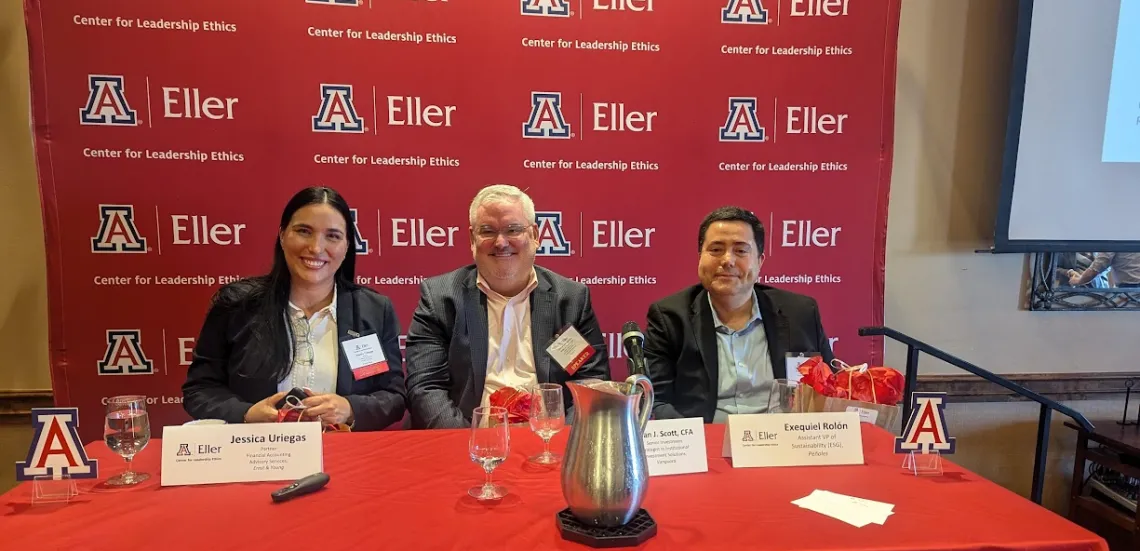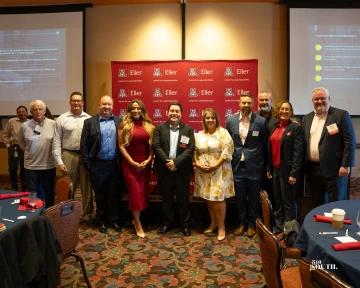Navigating ESG Challenges: Key Takeaways from the Executive Ethics Symposium on Sustainable Business Practices

On September 6, members of the business, government, and nonprofit sectors in Tucson gathered at the Executive Ethics Symposium, at the Hacienda del Sol Resort. The symposium, hosted annually by the Center for Leadership Ethics (CLE) in the Eller College of Management, attracted over 150 attendees, including faculty, staff, alumni and various local stakeholders eager to engage in a comprehensive discussion on environmental, social and governance (ESG) issues.
"Given the recent media coverage on ESG, we thought the timing was ideal to explore the topic with a dynamic panel of experts," says Paul Melendez, university distinguished outreach professor and founder of the Center for Leadership Ethics.
Among the attendees were Doug and Claudia Zanes, who have not only been loyal sponsors of the event since 2018, but also continue to demonstrate their commitment to our community, with Doug serving as the chair of the CLE Advisory Board and Claudia offering her unwavering support as a dedicated advocate for the College.
The panel featured three experts in their fields: Exequial Rolon, assistant vice president of sustainability at Peñoles, Brian J. Scott, senior investment strategist in Institutional Investment Solutions at Vanguard, and Jessica Uriegas, partner in Financial Accounting Advisory Services at Ernst & Young. Their insights offered a wide-ranging view of the ethical debates surrounding ESG and its implications for modern organizations.

Rolon emphasized the critical role of ESG in the mining industry. With a focus on decarbonization, he discussed how the industry is working to mitigate its impact on climate change. He highlighted the importance of transparency and building trust within the mining sector, noting that these elements are crucial for maintaining stakeholder confidence and ensuring sustainable practices. Rolon’s presentation underscored that environmental responsibility is not merely a regulatory obligation but a fundamental component of ethical business operations in resource extraction.
Scott provided a deep dive into the evolving ESG market, particularly in mutual funds. He revealed that the size of the ESG market has doubled over the past five years, driven largely by younger investors who prioritize alignment with their values. Scott explained that this growing interest stems from various motivations, including environmental concerns, religious values and a preference for governance practices that foster social responsibility. His analysis reflected a broader shift towards investments that contribute positively to society and the environment, signaling a significant transformation in investor priorities.
Uriegas offered insights into the latest regulatory developments affecting corporate sustainability. She discussed the new corporate sustainability reporting directive and climate-related regulations that are shaping the landscape of financial accounting and advisory services. Uriegas highlighted how these regulations are pushing organizations to adopt more robust sustainability practices and enhance their reporting transparency. Her perspective illustrated the increasing pressure on companies to align their operations with evolving environmental and social expectations.
The symposium concluded with an engaging Q&A session that allowed attendees to delve deeper into the topics discussed. The interactive dialogue provided a platform for the Tucson community to ask questions, share perspectives, and explore the practical implications of ESG principles in their respective sectors. This segment of the event emphasized the collaborative spirit of the symposium and the shared commitment to addressing ethical challenges in today's complex business environment.
The Executive Ethics Symposium successfully illuminated the multifaceted nature of ESG considerations, offering valuable insights into how organizations can navigate these ethical dimensions while striving for sustainability and social responsibility. The event not only fostered a deeper understanding of ESG issues but also strengthened the community's resolve to integrate these principles into their professional practices.

